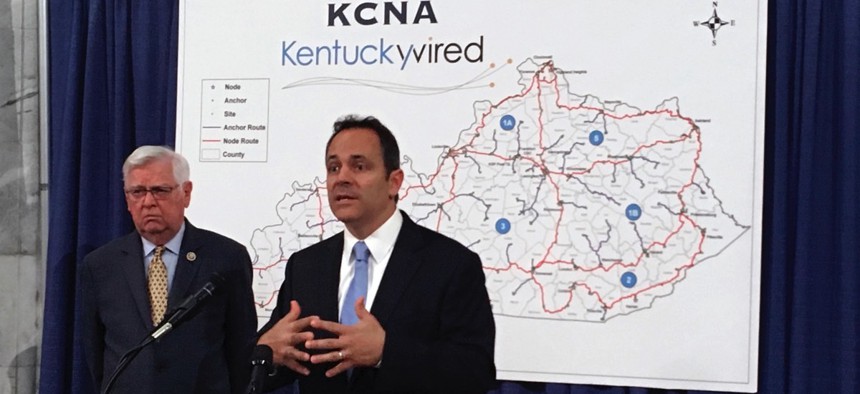Many States Remain Stumbling Blocks for Improving Local Broadband Access

Gov. Matt Bevin discusses the status of Kentucky's broadband network in September. Adam Beam / AP Photo
Next Century Cities details its policy priorities in its 2017 Emerging Issues Policy Agenda.
Convincing states to cede broadband authority to local governments is a top legislative priority for mayors and other municipal leaders who are members of Next Century Cities, a growing network that advocates for broadband expansion.
In the group’s recently released 2017 Emerging Issues Policy Agenda, few states have crafted policies to increase investment and improve access to next-generation internet, yet at least 20 limit localities’ ability to build networks with requirements like voter referendums.
Often these procedural hurdles are proposed by “politically powerful incumbent providers at the expense of local businesses and residents,” according to NCC, though the bipartisan, nonprofit membership organization accepts states will remain the primary decisionmakers presently.
“The 166 mayors and city leaders in Next Century Cities have always felt strongly that internet access is basic and critical infrastructure, for people in their day-to-day lives—and now state and federal policymakers on both sides of the aisle agree,” Deb Socia, NCC executive director, said in a statement. “The question we face in 2017 is how to help communities across the nation achieve and expand high-quality internet access to more Americans.”
Increasing competition between internet service providers in apartment buildings and condominiums is one possibility, managers often entering into exclusive arrangements with incumbent cable and telephone companies.
Local policies are the key to shifting that dynamic, according to NCC, including San Francisco approving first-of-its-kind legislation preventing landlords from barring certain ISPs from entering the premises.
County and city governments can explore conduit and open fiber networks to give customers more ISP choices, bolstered by state and federal regulators acting to limit telecommunications mergers resulting in monopolies with their predatory pricing.
Getting high-quality internet access for low-income households right the first time is also important, according to the agenda:
”[I]f a person’s first experiences with the internet involve frustrating delays or generally suboptimal experiences, they may be less likely to see its value.”
There’s no one-size-fits-all model for municipal broadband or future 5G wireless deployments, which local governments must develop new rules for well ahead of time for rights of way and small cell placement.

On a positive note, rural areas are increasingly becoming the focus of federal and state programs to improve internet access as a function of infrastructure funding once reserved for roads, bridges and utilities.
As President Trump formalizes and infrastructure package, NCC plans to push for business model-neutral investment targeting both rural and urban areas lacking ISP choice and involving communities in the process of establishing sustainable networks.
“Local governments are the key to better internet access for more Americans,” Socia said.
NCC’s full agenda complete with state and local success stories can be read here.
Dave Nyczepir is a News Editor at Government Executive’s Route Fifty and is based in Washington, D.C.
NEXT STORY: Rural Minnesota Facing the ‘Beginning of the Wave’ of Homeless Senior Citizens






